Army captain and physiotherapist Preet Chandi hopes her historic polar expedition will inspire others to pursue their goals and believe in themselves. She spoke to Robert Millett about the challenges she faced, both before and during her ground-breaking trek
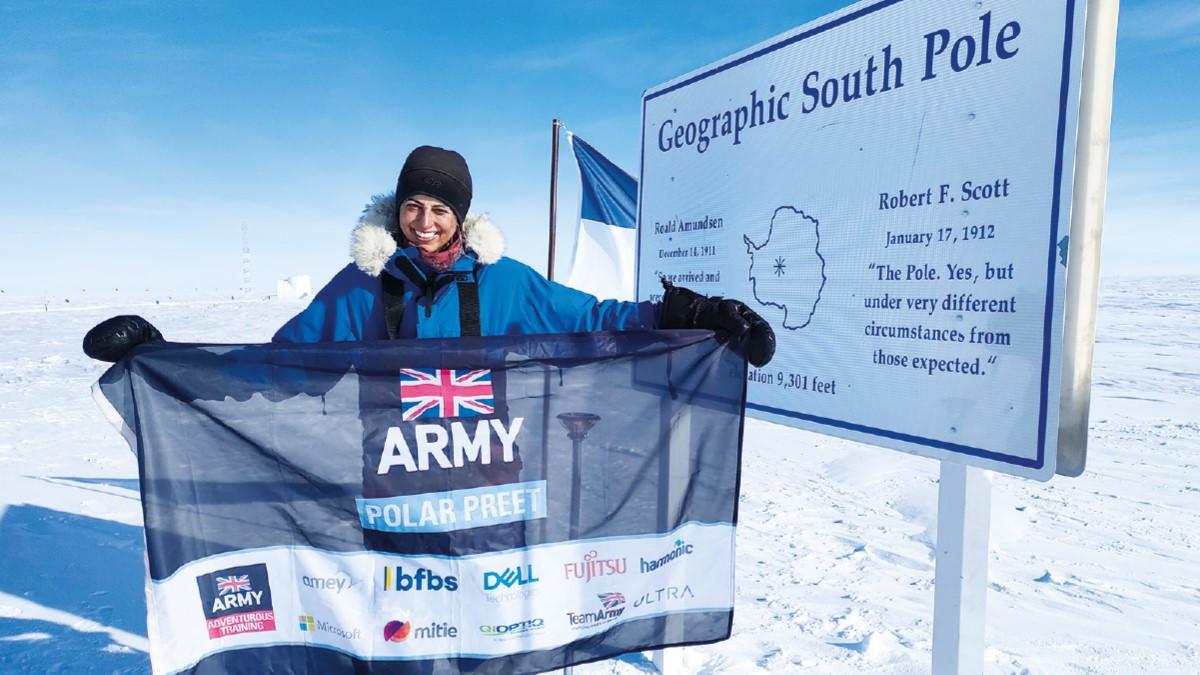
Breaking through boundaries
Preet Chandi had a remarkable start to the year. Just three days into 2022 she stood triumphantly at one of the most isolated and unvisited points on the planet, exhausted but elated, smiling at the falling snow; while reflecting on the fact she’d just completed an incredible 700-mile solo expedition to the South Pole.
By doing so she became the first woman of colour to complete a solo trek in Antarctica, and the third fastest female solo-skier to ever make the journey (reaching the endpoint in just 40 days, seven hours and three minutes).
It’s obvious that Preet exhibits a number of characteristics that have helped propel her into the history books. She comes across as incredibly self-driven, resilient and determined to both challenge and exceed her own expectations – as well as those of other people too.
But when we speak, a few weeks after her amazing feat, she is keen to point out – in a modest, humble tone – that it’s all too easy to focus on successful ‘happy endings’ and celebrate them, whilst overlooking the importance of promoting perseverance, self-belief and celebrating people’s ‘behind the scenes’ efforts to overcome their challenges, stay positive and withstand any resistance they face, at whatever stage they may be of pursuing their goals.
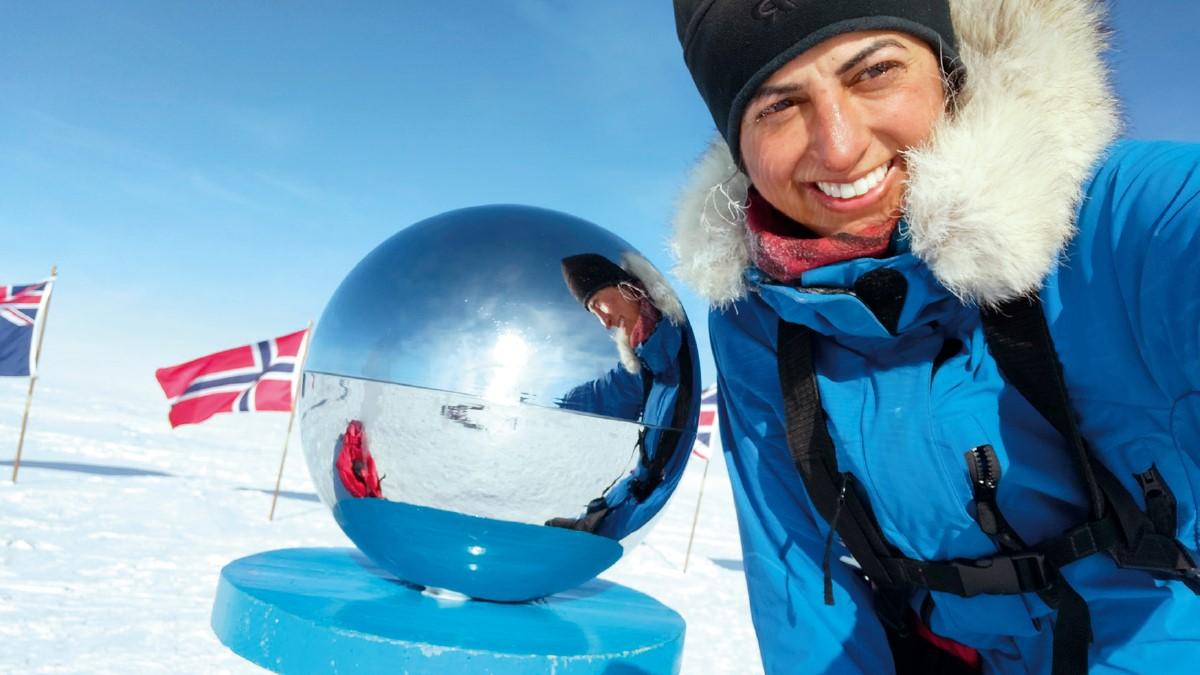
‘Now it all seems like it was a great idea, and everything that’s been said about it is very positive,’ Preet says, in reference to the fantastic feedback and media coverage she’s received since her expedition's success.
‘But I think it’s important to look back and be honest as, actually, over the last two years, when I was training and preparing for it, it wasn’t like that all – it was really hard work!
‘Not only the training, but taking on something I didn’t know much about, getting people on board, gaining funding and getting support for it all.’
All of which, she adds, was made doubly difficult by the pandemic.
A lot of people pointed out so many reasons why I shouldn’t do it, and I kept being told: “It’s not the right time, because of Covid”. But I thought to myself: “Just keep going, keep pushing on, keep training hard, and eventually it will pay off”. And here I am
But what motivated her to so steadfastly pursue her goal? And why did she opt for a trek to the South Pole as her challenge of choice?
‘I always wanted to do something big, but for a long time I just didn’t know what it would be,’ she explains.
In the end, she ambitiously decided to attempt an Antarctica expedition, precisely because she didn’t have any prior experience or knowledge about what would be involved.
‘I didn’t grow up reading about Shackleton or Amundsen or Scott,’ Preet says.
‘I knew nothing about the expedition stats or who had been there, and that’s why I wanted to do it. I wanted to do something that completely pushed me outside of my comfort zone.
‘Something that might hopefully inspire other people to do the same and step out of their comfort zones.’
A physio’s path to the Pole
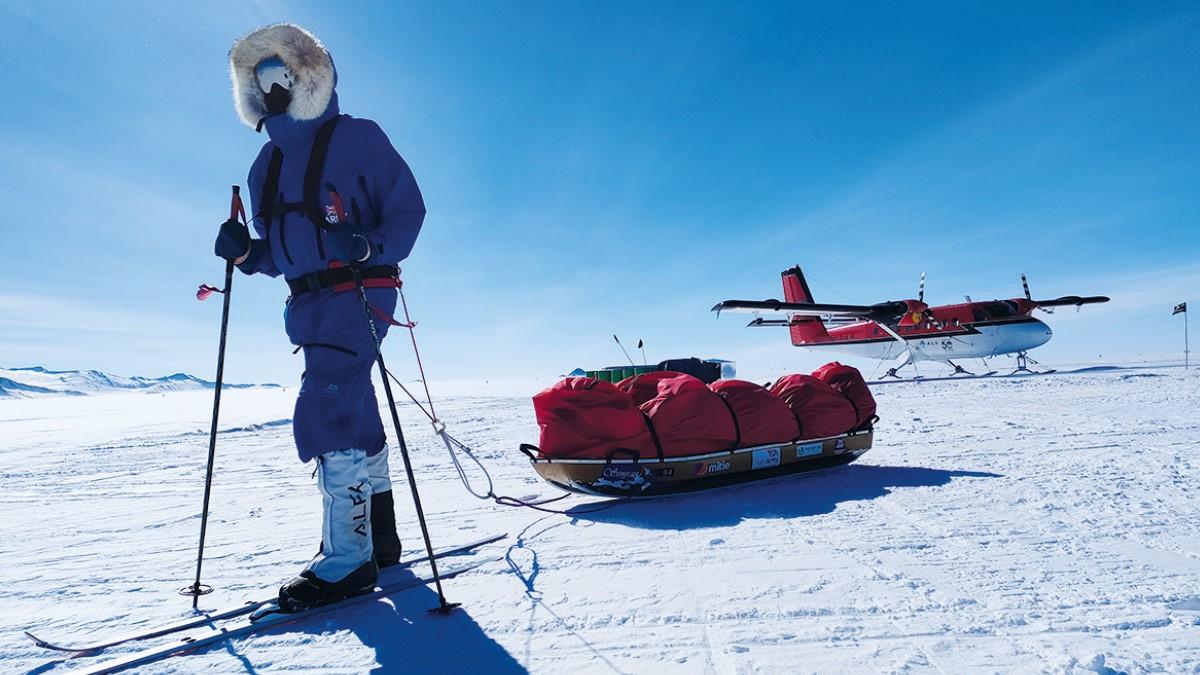
Back home, in her everyday life, Preet works as an Army captain and task-force physiotherapist. She currently lives in Derby, with her partner, but her army unit is based in Preston and she frequently travels elsewhere due to her military postings.
She first joined the army reserves while still a teenager, and went on to train as a physio at St George’s, University of London, before deciding to pursue a full-time career in the army. Since then, she has been involved in large-scale military exercises and deployments in locations all over the world – including in Nepal, Kenya and South Sudan.
Entering into the Polar world was all about breaking down barriers. It was something I didn’t know much about, and an area where there hasn’t been a huge amount of diversity
Alongside her military duties, Preet says she’s always been interested in exploring and pushing the human body to its limits, both personally and academically too. From an early age she was involved in sporting activities – training for a number of years at prestigious tennis academies – and her athleticism later evolved into an interest in participating in endurance events and adventurous pursuits, including mountaineering, hiking and ultra-marathons.
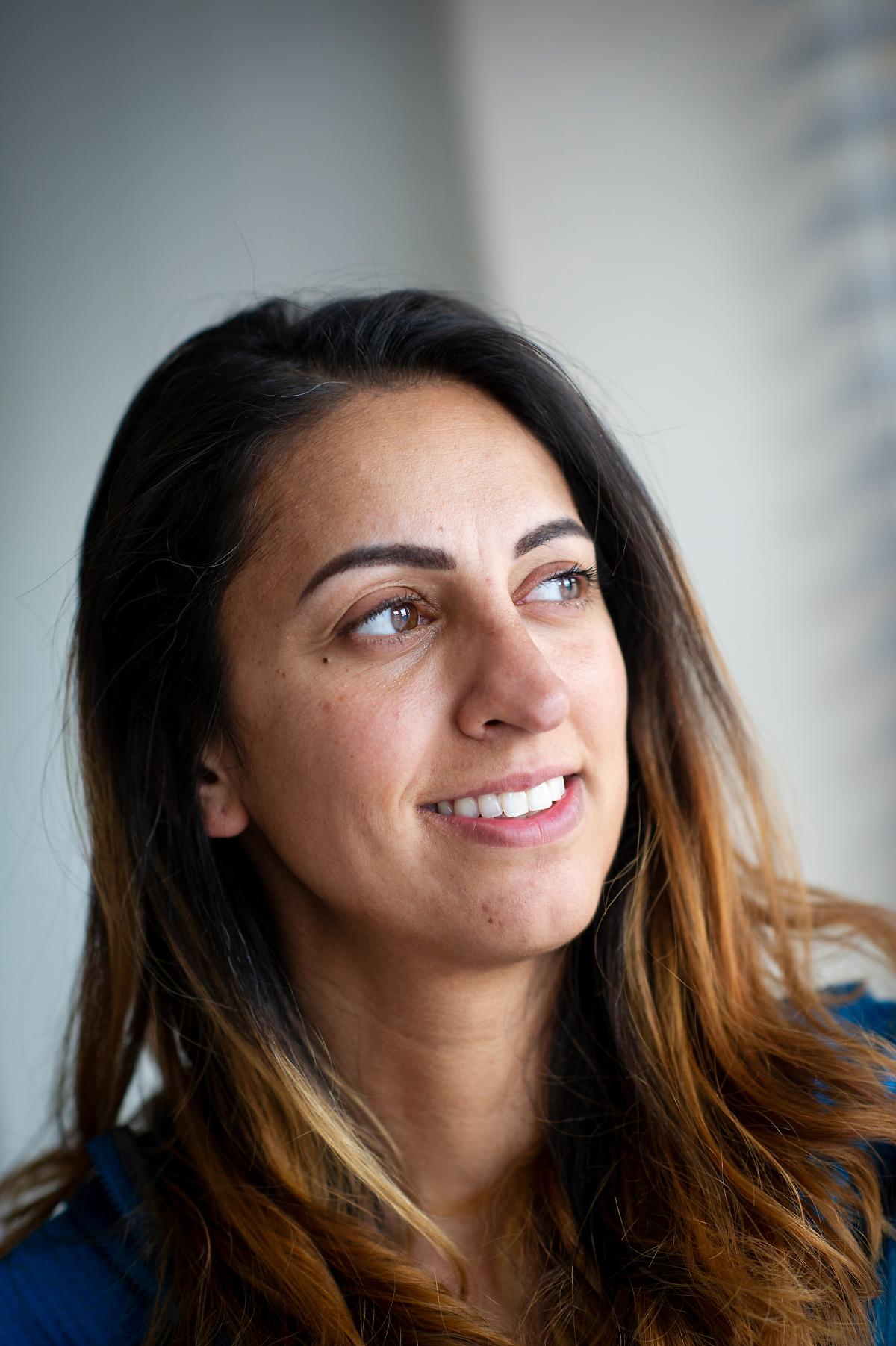
Meanwhile, just last year, while simultaneously training for her Polar journey, she also managed to complete an MSc in Sports and Exercise Medicine at Queen Mary’s University, which allowed her to examine how far the boundaries of the human body’s physical capabilities can be stretched, from a research perspective.
‘I joined the army at 19 with hardly any GCSEs, and no A-levels, and I was terrified that I wouldn’t get on to my degree course,’ Preet recalls.
‘I didn’t feel very academic at all, at that point in my life, but I think it’s important to remember that everybody starts somewhere, and wherever you are in life, you need to believe in yourself.’
Preet’s MSc knowledge – along with the physio skills she already possessed – held her in good stead when it came to dealing with any physical difficulties that arose during her expedition.
‘I taped my knee up while I was out there, and also my left shoulder – and I also did some strapping,’ she says.
'And I was very aware of all the muscles I was using every day.'
I could really feel the strain on my posterior chain and my upper traps. And I made sure to check my legs and feet every single day, to make sure I wasn’t getting any injuries or blisters
But her physio skills and sports exercise knowledge came more to the fore during her pre-expedition training period, she says; helping her to avoid any injuries and maximise her training results.
A huge undertaking
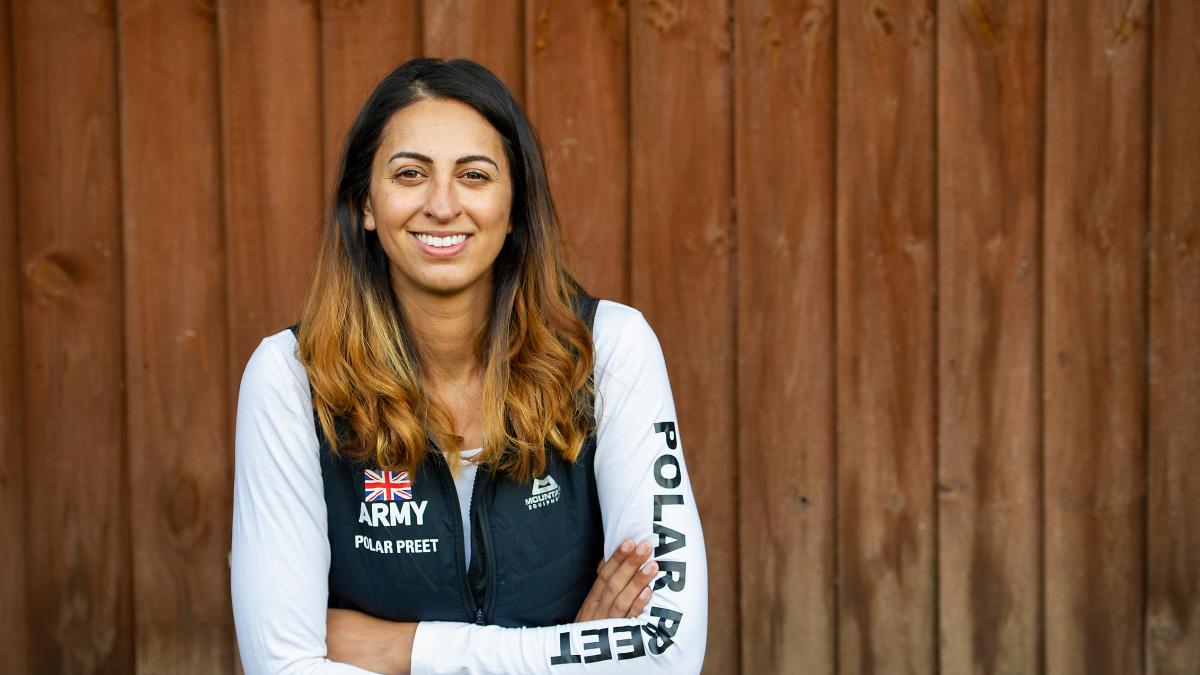
The training, planning and logistical commitments of prepping for such an immense expedition proved to be a ‘huge undertaking’, Preet says, which pretty much ‘took over her life’ and dominated most of her evenings over the space of two years.
To get herself ready physically, she undertook an exercise regime of two weekly sessions of both strength and cardio training.
And to simulate the pulling of her expedition pulk [a type of sleigh] Preet wore a harness and hauled first one, and then two, heavy tyres over increasing distances.
She also worked with a nutritionist and a training coach, both of whose approaches she found really helpful.
‘The coaching made me accountable, which I really liked,’ Preet says. ‘It also meant I then didn’t have to think about it, as somebody else was designing the program for me and all I had to do was go on an app and write up what I’d done. So that made life easier.’
Additionally, to get accustomed to the type of environment she’d encounter, she spent 27 days on a practice expedition in Greenland (during her summer leave from the Army) and another seven days training with her expedition manager, Louis Rudd, in Iceland.
Pushing mental and physical limits
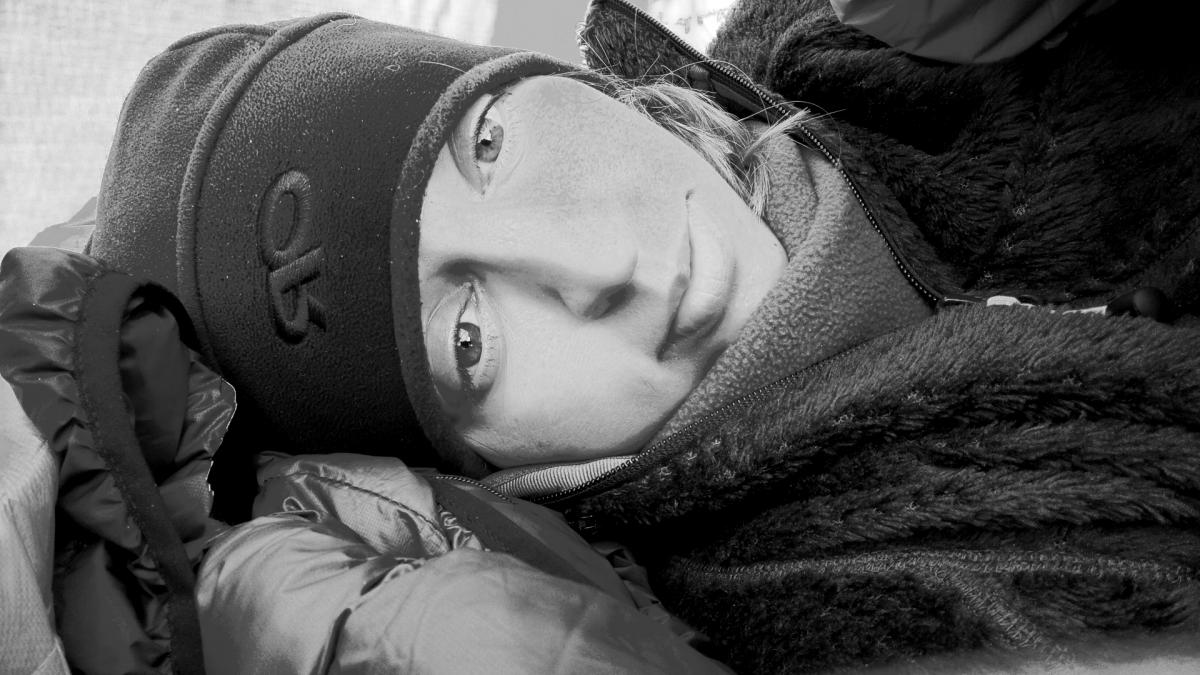
During the actual expedition, Preet endured temperatures as low as -50°C and had to continually pull the pulk behind her, laden with all the fuel, freeze-dried food and camping equipment she needed to survive.
‘I was on skis and had a harness, with a rope attached to the pulk and that carried all my kit, which weighed about 95 kilos.’
As she travelled forwards, navigating to pre-determined waypoints on the route using both a map and compass and GPS equipment, Preet had a list of inspirational audio books to keep her company, as well as pre-recorded voice messages from family and friends, which she says ‘really helped me along the way’.
She also had positive affirmations on display, written on her tent, and a once a day check-in call with her expedition company, to report the distance she’d travelled each day and also to let them know how she was feeling.

The trek ‘got very tough’ around the halfway mark, Preet says, when she started to encounter long stretches of Sastrugi [steep sided, wave-like ridges of hard snow, formed by the strong winds].
These unpredictable formations – along with the onslaught of the harsh Polar winds, which can reach speeds of up to 60 miles per hour – often caused her to lose her footing.
‘It was so windy and I kept falling down into them, over and over again,’ she says.
I’d get back up and the wind was so relentless that all I could do was just concentrate on putting one foot in front of the other
Adding to this, she developed a lingering cough, which lasted for most of her journey – but which was, thankfully, not Covid related, as she underwent regular testing to rule this out.
But despite all these difficulties, Preet kept pushing through and did her utmost to stay positive and maintain a good pace.
‘At the end of each day, I’d put the tent up, get the stove on and suddenly find myself thinking “You know what, I feel a lot better now. I’m safe in the tent and I’ve had some hot food,’” she recalls.
‘And then in the morning I would keep going, just taking one day at a time.’
Much of the time she couldn’t see much of the scenery around or ahead of her, as the details were lost in a wind-strewn haze of ‘different shades of white’.
But on a few, rare occasions, when the weather conditions grew milder than usual and allowed a clearer view, she was able to take a minute to appreciate the beauty of the awe-inspiring landscape she was travelling through.
Some days were really, really hard, but I had at least two days where there was minimal wind and I thought “Wow, this is so amazing” because it was just incredible out there
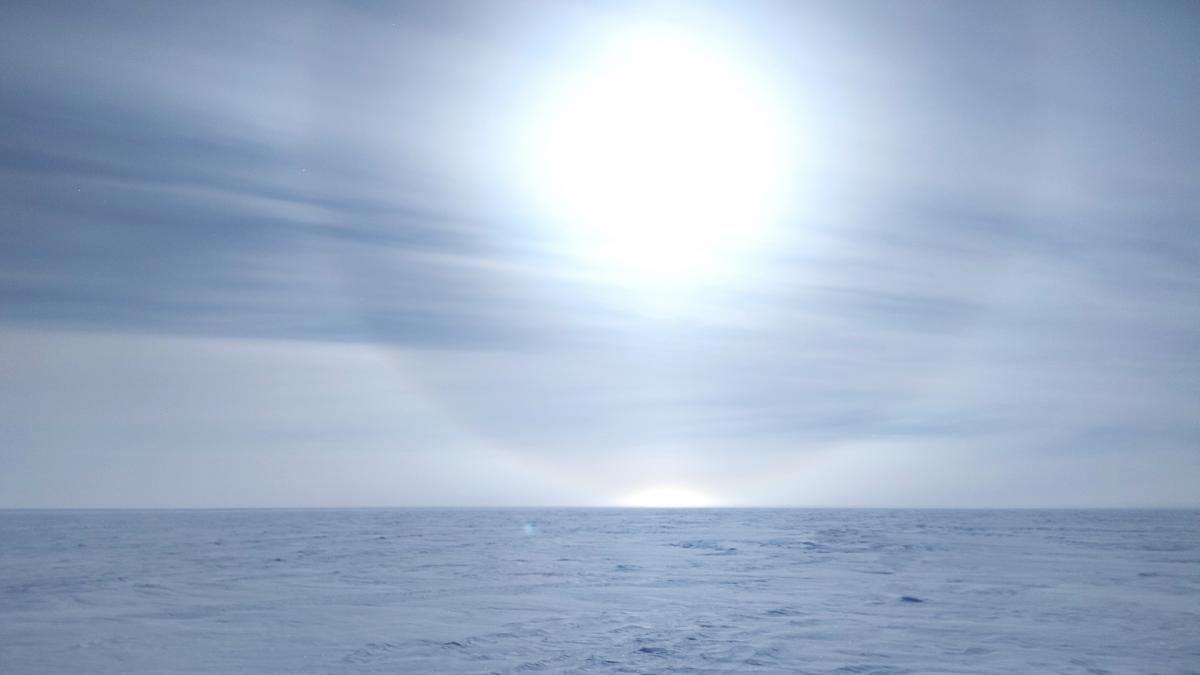
Although she was lucky enough to avoid any injuries during the expedition, the physical pressures of such a long trek inevitably took their toll and Preet found herself suffering from exhaustion towards the end of her 700-mile journey.
‘By the time I’d finished I’d lost 10 kilos and that wasn’t just fat, it was muscle loss as well,’ she says.
Adding to the physical challenges she faced, Preet also had to contend with the mental challenge of being alone for so long, whilst travelling through an entirely isolated environment.
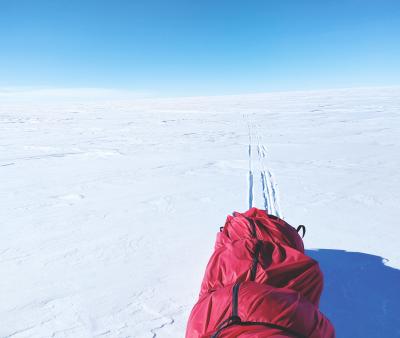
‘Being on your own actually takes a physical toll as well, because you’re always having to concentrate,’ Preet says, as she explains how – without the luxury that a team affords, of being able to share responsibilities with someone else – she had to stay continually ‘alert’ and focused on all of her daily tasks.
‘If I wasn’t skiing, I was putting the tent up and then cooking and then melting snow and then doing necessary admin, and then I needed to get to sleep. So I was never not doing anything.
‘And when you ski alone there’s no track to follow. You never have anyone else in front leading the way, so you are always the person “breaking trail” and that can be quite difficult, in terms of maintaining concentration.’
Overcoming expectations

Since returning to the UK she’s had a homecoming event, which gave her a welcome chance to catch up and celebrate with her family and friends, and received far more media attention than she’d imagined.
She hopes that coverage of her expedition helps to break down stereotypes and prompt others to expand their horizons and re-think what’s possible for them to achieve.
‘I’ve been told, “Oh you don’t look like a Polar explorer” because I’m not the image of a Polar explorer that people have come to expect,’ Preet says.
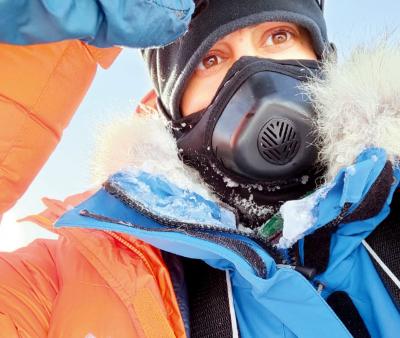
‘So I wanted to show people that you can break those expectations – and that you don’t have to fit into any kind of preconceived box.
‘As an Asian female, becoming a physiotherapist and joining the army, both weren’t consider the “norm” for me, and there’s been so many things in my life that people told me I shouldn’t do, or that wouldn’t be the norm for me to do.
‘So for me, entering into the Polar world was all about breaking down barriers. It was something I didn’t know much about, and an area where there hasn’t been a huge amount of diversity.
I did it not only to push myself to my own physical and mental limits but also, hopefully, to inspire other people to do the same and to push their boundaries
‘I always say: “nothing’s impossible” and “believe in yourself”. And I know it’s easy for me to sit here and tell other people to believe in themselves – but it’s amazing how important that actually is.’
Number of subscribers: 1




































